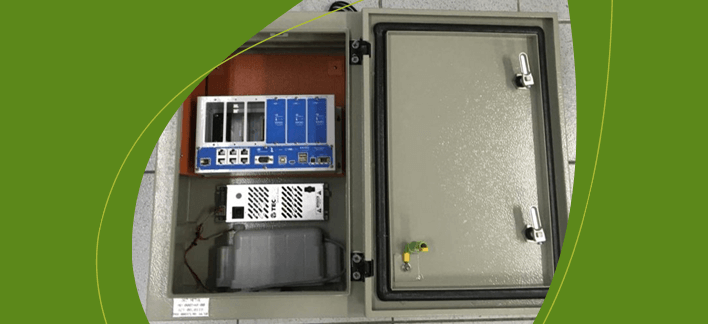
Neoenergia develops national technology for the communication of smart grid equipment
Besides using analytics, smart grid sensors and power meters are already part of the technologies adopted by Neoenergia, in a trend that shall grow in the electric industry in the next years. Once more contributing to innovation, the company created the Multilink concentrator in order to connect this equipment. One of Multilink’s benefits is that it is an interoperable solution, i.e. it is compatible with equipment from different manufacturers. The project adopts an open standard for communication through Wi-SUN mesh radiofrequency grids. The initiative is part of the Research and Development Program, regulated by the Brazilian Electricity Regulatory Agency (Aneel, in the Brazilian acronym).
“Neoenergia is pioneer in the development of this technology, which contributes to our digitizing strategy for customers through the use of interoperable and open standards. The outcomes are optimized investments in measurement and automation infrastructure which will allow the quality improvement for supplying and managing the customer’s consumption”, states the Technology Strategic Project Manager, Mr. José Luiz de França Neto.
WHAT IS MULTILINK?
The Multilink concentrator acts as a link between field equipment and the operation and data centers. For such purpose, it gathers data from the so-called “end devices” which are smart meters and sensors, in addition to balance meters and the Centralized Measurement System (CMS) equipment. This information is encrypted and then sent to the measurement and operation systems of the companies. With this procedure, it is possible not only to perform the remote reading of the costumer’s energy consumption but also the real-time analysis of the power grid in order to improve the supply.
Multilink will receive data through a gateway, a product also developed on the project, and from end devices developed by manufacturers that adopted the Wi-SUN standard.
In order to transmit the information to the systems of distribution companies, Multilink may use multiple communication channels, including 4G-LTE mobile networks, WiMAX, satellite and digital radio at the 2,4 GHz frequency with OFDM (orthogonal frequency-division multiplexing) modulation, which turns the transmitted signal more resilient to interferences. Multilink also has expansion ports for connection with other means of communication already existing or that may arise in the future.
The project was initiated by Neoenergia in 2018, lasting three years. The solution was tested in the city of Salvador (BA), with smart sensors created under the P&D scope of Neoenergia. “We already have very promising results from the Multilink concentrator regarding its interoperability and use of several communication channels. This equipment is part of a strategic structuring project called “Development of National Technology for Smart Power Grids”, with its main purpose being the development of Brazilian technologies that contribute to the reduction of losses, and improvement of the grid’s
quality and safety”, says the Research and Development Manager of Neoenergia, Mr. José Antônio Brito.
The development of the communication technology is carried out jointly with Tecsys and Lactec, members of the Wi-SUN Alliance, an international consortium to certify and disseminate solutions in this area. The standard is based on the IEEE 802.15.4g, adopted in applications related to smart grids, smart cities, and Internet of Things (IoT), which require flexibility and resilience from the field grid, now supported by the new Multilink technology.
NATIONAL DLMS PROTOCOL
Seeking more interoperable solutions for smart meters, Neoenergia is contributing to the development of a proposal for the Brazilian DLMS (Device Language Message Specification) protocol, with the purpose of promoting the evaluation of the national standard defined by ABNT (Brazilian Association of Technical Standards). The project is also part of the Research and Development Program of Aneel.
Neoenergia presented an initial proposal for the DLMS profile, to serve as basis for the definition of the national protocol. The objectives of the work group is to adapt the Brazilian regulatory standards to the international standard and to promote the interoperability of the smart meters, stimulating its use in the country”, explains Ms. Débora Catão, Smart Grid Engineer of Neoenergia.
The company participates in work groups, such as the Brazilian Committee of Electricity, Electronics, Lighting and Telecommunications (COBEI, in the Brazilian acronym), composed by power distribution companies and equipment manufacturers. After the proposal conclusion, it shall be submitted for public inquiry by ABNT before being approved. A certification laboratory for interoperable meters will also be build.
In the Multilink project, we had the opportunity to develop Wi-SUN hardware and software, when this standard was still in the specification process by the global alliance. Today, it operates in an integrated manner with equipment from global manufacturers. With the development of the Brazilian DLMS protocol, we shall have a full interoperability chain with national technological dominance. The implementation of Multilink and the certification laboratories will ensure the continuity of the interoperability and the technological knowledge”, states the senior researcher and project coordinator from Lactec, Mr. Rodrigo Jardim Riella.
News
2025-03-27
Instituto Neoenergia lança chamada inédita unificada de editais para apoiar projetos sociais
2025-03-21
Neoenergia é reconhecida entre as empresas mais exemplares do mundo em sustentabilidade
2025-03-14
Neoenergia lança campanha para fortalecer o relacionamento com o cliente
2025-03-13
Neoenergia inaugura novo Centro de Monitoramento de Ativos da Transmissão em Campinas
2025-03-11
